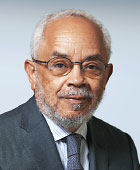The landscapes and seascapes caught by the camera in this 2017 film are enough to tempt anyone to sit and wait for the story to unfold. The villa sits high up overlooking the sea at the very water’s edge, reminding me of hypnotizing geography I have seen in Croatia and, of course, in Barbados. However, this film is set in the South of France. It is named “La Villa” in French and marketed as “The House by the Sea” for Anglophone audiences. Written and directed by Robert Guédiguian and running for 107 minutes, the movie focuses on the transactions taking place within a finely crafted family space. The film was screened at the 74th Venice International Film Festival.
The movie opens with the camera riveted on the patriarch of the family. The action is slow. We understand eventually that he has had a cerebrovascular accident. We see him later in a wheelchair or a bed, presumably following his return home from hospital. He neither speaks nor moves. He has lost his ability to comprehend anything. He just stares ahead unflinchingly. It is around this impaired family elder that the story unfolds. His rigid body deflects the soliloquies that his offspring aim at him. The camera melds people and the stunning beauty of the region.
The major cast of characters is relatively small. Angèle is the daughter in her 60s who returns home to participate in the discussions about what now needs to be done. About what, you ask. Well, one might say that is the focus of the film. She is a successful actress, accustomed to all the drama on stage. However, she is not adept at dealing with difficult situations in her life. She left home a couple of decades ago right after her young daughter drowned when left in the care of the patriarch. The girl’s father never forgave Angèle for the accident, and he left town. Angèle nourished a grudge against her father. Her two losses kept her estranged from the villa and the patriarch for decades. Her pent-up rage, the shame, the disgust found room just below the surface. So, when Benjamin, a young fisherman from the area who idolizes the famous actress, declares his interest in her, the defrosting of her protective guard takes a while. It comes partly because he can recite by heart snippets of Paul Claudel’s writing and because he is persistent. Her face slowly loses its fixed glare. Benjamin takes her out in his fishing boat. The rippling waves wipe away years of tears and lamentations.
There are two brothers. One is the writer, Joseph, who returns for the family reunion accompanied by a fiancée half his age. Viewers will see him differently, perhaps as a failed hippie intellectual or as someone searching for Zion. He is evidently unhappy. The other sibling is Armand, who remained at home and runs the family restaurant. There is always disappointment in those who stay home, care for the first generation, and complain about not being appreciated by siblings who left. Armand is good friends with a couple who live next door. They have stayed home, too, and retired. But the going is financially rough for them. Of especial note is their unwillingness to accept help from their attentive and supportive physician-son who takes pleasure in offering money to lighten his parents’ load. The parents eventually find peace in a collaborative suicide pact. The medic decides to leave the town, but after he has seduced Joseph’s fiancée. They promise to connect in London.
There are others, disconnected from the villa, who occasionally enter the narrative. First come a trio of young illegal immigrants. Then there is a team of soldiers seeking the illegal migrants. Among them is a Black soldier who brings up the race question in every other sentence he addresses to people from whom he seeks information. These are irrelevancies in an otherwise tight story line. One might still connect them to the main theme because of the uncertainty of the central characters’ futures. There is change in the air because real estate agents and developers are snooping around.
Suddenly, the film becomes a wonderful stimulus for discussion within a general or psychiatric educational context. What is the patriarch’s psychiatric and legal status? Does he need a guardian? Is the neighbors’ decision to die by suicide justifiable? Do the three siblings need psychiatric or pastoral care? Might a psychiatrist be helpful in contributing to the development of a firmer family structure, undergirding maintenance of the villa and the restaurant? Should the siblings make new commitments to people and the place by the sea? ■

